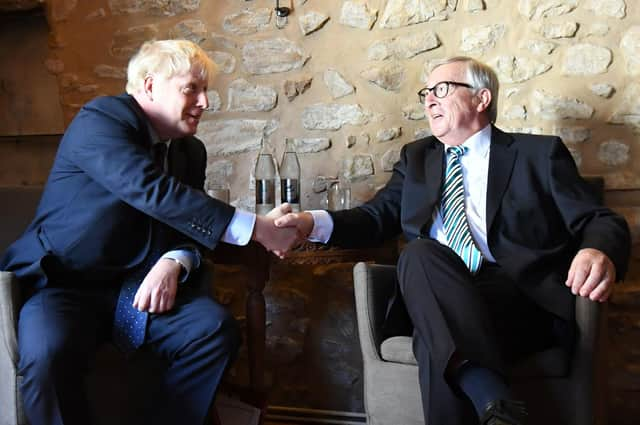Boris’s Brexit deal might be flawed but it still undermines the SNP fatally - Brian Monteith


In many respects I am probably a Brexit purist and am immediately drawn to identify and remain concerned about the problems that remain unresolved, the elephant traps lurking in the detail, the heady optimism generated by Johnsonian bravado and bluster – all of which give unnecessary advantages to the EU.
Had Johnson genuinely been willing to leave the EU without a trade deal and do business like the majority of other countries who use WTO rules then we would not have agreed to fisheries being included in the negotiations. As a result of this key decision taken by Michael Gove when he was a minister for Theresa May – and never rescinded by Johnson – the UK government won back only 25% of additional catch from our own fisheries over the next five and a half years, because it feared losing out on other aspects of trade.
Advertisement
Hide AdAdvertisement
Hide AdTo increase that share from 2026 will require further negotiation and likely compensation to EU boats for us to catch our own resource – or, if we simply take back full control, we could see tariffs on fish or even the suspension of the trade and road transport sections of the agreement. Fishing communities around the whole of the UK coastline will think of opportunities lost once more. The outcome could have been so much better.
The UK government must now increase significantly the funding to support the rebirth of the fishing industry and the communities that can blossom under it. The £100m promised from HM Treasury is insufficient when one considers the SNP can squander £230m on two ferries that show little sign of ever leaving their docks.
Likewise, the acceptance of existing EU procurement rules is disappointing news for Scottish industry as well as UK defence and shipbuilding and maintains concerns about a drift towards deeper EU military partnerships that will only serve to weaken Nato and our US security alliance. More fundamentally, the Conservatives’ willingness to allow Northern Ireland to be partitioned out of the UK’s own regulatory and customs jurisdiction remains to me unpardonable for a party that claims to maintain the union. The outcomes of all those sections could have been so much better.
Yet for all that Johnson will claim – with some justification – that he has played well a hand originally weakened by Theresa May’s connivance and the anti-democratic obstructions of a remainer parliament. For all I believe the agreement’s faults should be called out – so they might at least be mitigated if not circumvented – the Prime Minister’s deal does appear better than I expected.
The grip of the European Courts of justice on trade appears to have been broken; the UK shall continue to trade with the EU without tariffs and quotas; unlike Norway no UK monies will go to Brussels; freedom of movement that allowed convicted criminals and sex traffickers easy passage through our borders will now end;
The SNP’s complaints regarding the loss of the Erasmus educational programme and the failure to include the export of seed potatoes in the agreement only expose the illogicality of their position.
The UK’s new “Turing” international educational programme will offer greater financial support to double the number of students who will be able to access more countries than the EU’s Erasmus scheme ever did. Only an EU zealot would not welcome this improvement for British students. That SNP ministers argue the deal’s impact on Scottish seed potato farmers will be disastrous – when exports to the EU represents only 5% of sales compared to 12% sold in Scotland, 50% going to the remainder of the UK and 29% to the rest of the world – only exposes the absurdity of proposing Scotland leaves the UK, not the EU.
In little more than a year Johnson has won a famous election victory, he has pulled off a transition deal most doubted he could deliver and now political reality suggests he is likely to see his Brexit deal be passed in Parliament.
Advertisement
Hide AdAdvertisement
Hide AdAt a stroke it eviscerates the SNP argument for independence from the UK only for Scotland to join the EU – which is why the SNP will vote against it this week.
A separated Scotland would need to choose between using the British pound or joining the EU – for the EU will not accept a member that uses the currency of a country outside its membership.
A separated Scotland would have to hand back the 25% additional fishing catch now gained after losing control to the Common Fisheries Policy. It must be prepared to lose any Freeports and the thousands of jobs that undoubtedly shall come as result of their arrival. Indeed any divergence that creates new jobs and prosperity will be put at risk by the SNP’s continued love-in with the EU.
Worse still for the SNP, now that Nicola Sturgeon has served her purpose as the EU’s useful irritant to the UK we can expect her love for the Brussels institution to become suddenly unrequited.
In avoiding the No-Deal scenario that Sturgeon projected as the super-grievance to justify a further referendum the Prime minister’s denial of a further vote shall be strengthened, not weakened, and her overwrought spectre of Scottish economic collapse no longer offer’s the threat it once did.
As time passes the prospect of rejoining the EU will grow further and further distant, and thus the possibility of secession must also recede. The deal has many flaws, but helping the SNP is not one of them.
Brian Monteith is Editor of ThinkScotland.org